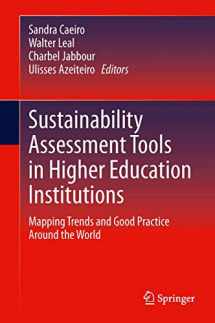
Sustainability Assessment Tools in Higher Education Institutions: Mapping Trends and Good Practices Around the World
ISBN-13:
9783319023748
ISBN-10:
3319023748
Edition:
2013
Author:
Walter Leal Filho, Ulisses M. Azeiteiro, Sandra Caeiro, Charbel Jabbour
Publication date:
2013
Publisher:
Springer
Format:
Hardcover
441 pages
FREE US shipping
Book details
ISBN-13:
9783319023748
ISBN-10:
3319023748
Edition:
2013
Author:
Walter Leal Filho, Ulisses M. Azeiteiro, Sandra Caeiro, Charbel Jabbour
Publication date:
2013
Publisher:
Springer
Format:
Hardcover
441 pages
Summary
Sustainability Assessment Tools in Higher Education Institutions: Mapping Trends and Good Practices Around the World (ISBN-13: 9783319023748 and ISBN-10: 3319023748), written by authors
Walter Leal Filho, Ulisses M. Azeiteiro, Sandra Caeiro, Charbel Jabbour, was published by Springer in 2013.
With an overall rating of 3.6 stars, it's a notable title among other
books. You can easily purchase or rent Sustainability Assessment Tools in Higher Education Institutions: Mapping Trends and Good Practices Around the World (Hardcover) from BooksRun,
along with many other new and used
books
and textbooks.
And, if you're looking to sell your copy, our current buyback offer is $0.3.
Description
This book contributes to debates on current sustainability practices, with a focus on assessment tools as applied in higher education institutions. These institutions are challenged to carry out management, research, and teaching, and to create settings that allow developing new competencies to address the complex global environmental, social, cultural, and economic pressures with which current and future generations are confronted.The first chapters discuss issues of sustainability in higher education, namely the role of universities in promoting sustainability and the emergent fields of sustainability science and education for sustainable development and how to integrate and motivate sustainability into the university. Subsequent chapters present examples of sustainability assessment tools specifically developed for higher education institutions, such as the AISHE – Auditing Instrument for Sustainability in Higher Education, the GASU – Graphical Assessment of Sustainability in Universities too, the STAUNCH – Sustainability tool for Auditing Universities Curricula in Higher Education. The use of other integrated tools are also presented. The papers have adopted a pragmatic approach, characterized by conceptual descriptions, including sustainability assessment and reorienting the curricula, on the one hand, and practical experiences on the other, with good practices from different edges of the world.Sustainability Assessment Tools in Higher Education Institutions will be of interest to graduate student, lecturers, researchers, and those setting university policy.


We would LOVE it if you could help us and other readers by reviewing the book
Book review

Congratulations! We have received your book review.
{user}
{createdAt}
by {truncated_author}


